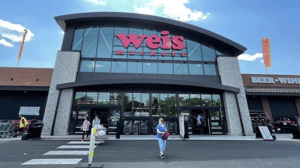AMERICAN FORESEES DELTA PAYOFF IN SECOND HALF
SALT LAKE CITY -- American Stores Co. here expects benefits from its Delta re-engineering projects to exceed costs for the second half of 1997, Victor L. Lund, chairman and chief executive officer, said in the company's annual report.Lund did not elaborate on that prediction in his letter to shareholders in the annual report; however, American devoted the bulk of the report to interviews with a variety
June 16, 1997
ELLIOT ZWIEBACH
SALT LAKE CITY -- American Stores Co. here expects benefits from its Delta re-engineering projects to exceed costs for the second half of 1997, Victor L. Lund, chairman and chief executive officer, said in the company's annual report.
Lund did not elaborate on that prediction in his letter to shareholders in the annual report; however, American devoted the bulk of the report to interviews with a variety of corporate personnel, some of whom reflected on some of the changes resulting from Delta initiatives.
Dwight Stanley, vice president of inventory management, said a new warehouse replenishment system that provides more accurate forecasting capabilities is being installed at a distribution center in La Habra, Calif.
He said American is also working with key suppliers to reduce excess inventory through the use of various inventory management and product flow initiatives, including continuous replenishment, vendor-managed inventory, cross docking and preassembled display pallet distribution, plus electronic data interchange.
"Over one-third of our entire company purchases are now handled electronically, without paper documents," Stanley said. "We are aggressively moving toward a paperless environment. From an inventory-management standpoint, EDI allows us to use information in place of inventory."
American is also consolidating warehouse facilities wherever possible, Stanley said, as in southern California, where four general merchandise facilities for Lucky Stores and Sav-on Drugs are being consolidated into one facility for both food and drug stores.
In another section of the annual report, Debra Biggerstaff, national product manager for the chain's central buying program, said creating partnerships with vendors was a key goal of the Delta programs.
"Vendors have been a little nervous about how American Stores could possibly pull this [central buying program] off [because] other companies have attempted and failed," she said.
"We asked vendors to appoint a high-level sales representative whose sole job was to work with us. They also built teams that matched up with our teams [to] create a partnership and allow for greater efficiencies, better communication and more effective promotional efforts."
The Delta initiatives have also helped make buying and promotions more efficient, Biggerstaff said, noting that a national three-year contract for gourmet whole bean bulk coffee will save the company millions of dollars, and similar national contracts for greeting cards and film processing "will save us even more. Each [of American's individual] division[s] could not have gained such savings by itself."
She also noted that American was able to save $280,000 a year by eliminating a value brand of coffee creamers. In other highlights of the annual report:
Donn Scherer, senior vice president of markets, said one of the Delta initiatives -- formation of a centralized real estate and construction group -- has enabled American to standardize retail units into two basic formats: a combination store for food, including several prototypes of different sizes, and a stand-alone drug store in two prototypes (one with liquor, one without).
Scherer also pointed out that American is now spending more than 5% of sales on capital expenditures, compared with only about 2% in 1992.
Dave Maher, president and chief operating officer, said American is interested in and actively looking at potential acquisitions "that would enhance markets we are in today or that are contiguous geographically to our markets [that] would lend themselves to food and drug synergies." He said any acquisitions must be accretive to earnings in the second year. Maher also said American will continue to allocate $1 billion a year for capital expenditures for the next several years, with plans this year for 100 to 110 new or replacement units.
Susan Rorke Lawler, co-manager of an Acme Market in Pike Creek, Del., said consumers with frequent-shopper cards spend almost four times more in the store than those without cards.
Jeff Braley, senior marketing manager for the Northern division of Lucky Stores, San Leandro, Calif., said Lucky will launch several major advertising campaigns for its private-label lines this year and will also introduce a target marketing program that duplicates one already in effect at American's Jewel subsidiary.
About the Author
You May Also Like






